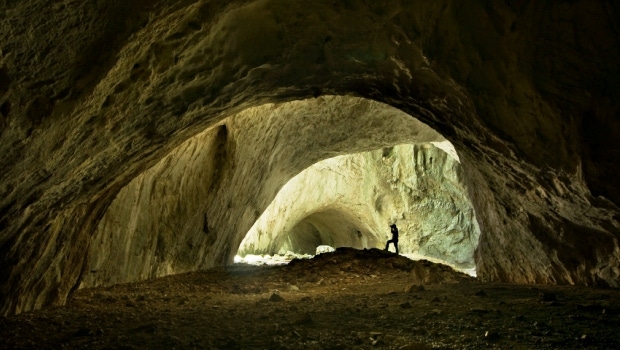An entrepreneur turns a former military cavern in Kansas into a sprawling self-storage facility, with enough space for traditional, records and vehicle storage. See what else he has in store for the 2.7-million-square-foot complex.
March 31, 2014

By Deb Hipp
Reprinted with permission from "The Storage Facilitator" blog.
Not many people get into the self-storage business as the result of a joke. For Coby Cullins, though, that’s exactly what happened. Cullins, a small-business owner, enjoys spelunking, the sport of exploring caves. So when two of his employees came across a former limestone mine and military storage complex being auctioned online in April 2013, they sent him the link, hoping to get a laugh. Instead, the idea intrigued Cullins, who’d read about limestone caves being converted into office space in other cities.
Since World War II, the federal government had owned the property in Atchison, Kan., a town on the Kansas-Missouri border that’s best known as the birthplace of aviator Amelia Earhart. The 2.7-million-square-foot complex spans 60 acres below ground and 125 acres above. Sections of the cave run as deep as 150 feet.
‘What Have I Gotten Myself Into?’
Exploring caves was one thing. Carving out a business from an old limestone mine would be another. Cullins already owned two businesses in Springfield, Mo.: National Safety Compliance, which helps employers meet OSHA requirements, and NSC Printing & Ministries, a provider of printing services to churches and missionaries.
It wasn’t as if Cullins would need to start from scratch. The U.S. Army had already converted the cavern into storage areas by installing concrete block walls and floors, electrical lighting, sump pumps, air-handling equipment, and an extensive (100,000 cubic feet per minute) dehumidification system. Over the years, the facility was used to store thousands of parachutes, medical supplies and US. Department of Defense documents.
Cullins saw the listing on a Friday, bid $510,000 that Saturday, and won the property on Sunday from GSA Auctions, a government website. Cullins, who missed the chance for two previous showings of the property, got to see his new cave one day after buying it. “What have I gotten myself into?” he wondered as he explored the mammoth cavern, unable to navigate the maze-like pathways without a map.
Even though he had no experience in the self-storage business, Cullins knew a climate-controlled cave safe from floods, tornadoes and other natural disasters would be perfect for all sorts of storage needs. But traditional self-storage is probably not going to be the main source of income, he realizes, seeing potential for the storage of business inventory, business records and heavy machinery.
Cullins promotes his business online and in Yellow Pages directories but also markets it during public tours of the facility five days per week. “Those tours have brought in the majority of our storage clients,” he says.
Adding On
Meanwhile, in the newly branded Citadel Caverns and Mo-Kan Underground Business Center, Cullins also has opened Extreme Underground, a cave complex for laser tag, archery, miniature golf and rock climbing. The attraction draws 200 to 300 people every weekend.
Furthermore, he recently hired an architecture firm to conduct a feasibility study, which came back favorably, to establish an underground center for storage of digital data. The architecture firm is searching for potential tenants.
Plans are even in the works for a “doomsday resort.” The Vivos Group in Del Mar, Calif., wants to use part of the cave for the Vivos Survival Shelter & Resort. For a $99 monthly membership fee or a one-time charge based on the size of a recreational vehicle, a member will be able to park an RV underground indefinitely during catastrophes, natural disasters and nuclear wars, and live in it with a year’s worth of supplies (costing $1,500 per person). The plan envisions space for 1,200 RVs and 5,000 people.
Even during non-apocalyptic times, members will be able to use the Vivos Resort and its many proposed amenities for up to 90 days per year. Those include a skateboard park, survival classes, field games, a restaurant, a kitchen, and a lounge and spa. The deal isn’t finalized yet, Cullins said, but negotiations are underway.
An Underground Town
Self-storage may never be as glamorous as a doomsday resort, but it’s still going to be a consistent revenue source for Citadel’s underground space, which offers climate-controlled storage for a price that most people pay for outside units. Storage rooms start at $35 a month for a 5-by-10. High-security storage in the same size starts at $75 monthly. Citadel offers caged storage, and storage for boats, RVs and other vehicles.
“We bring the boats inside and take them out when customers need them,” said Brent Donaldson, facility supervisor. “All the customer has to do is hook [it] up and leave.”
As he zipped around the cavern on a motorized golf cart, Donaldson remarked that the space is like a small town. He and another maintenance staffer clean concrete floors with street sweepers, do a weekly check on 28 sump pumps (to pump out groundwater during heavy rains), maintain a gas-fired dehumidification system, and keep an eye on ceiling-crack monitors previously installed by Army engineers.
Cullins said the storage facility started with 10 10-by-10 units and a couple of high-security units, with more under construction. Right now, about 46,000 square feet of the cave is taken up by equipment from a local foundry.
Annual costs for utilities, mowing, environmental upkeep and two maintenance employees run about $300,000, Cullins said. “This facility takes a large amount of money to operate and keep in usable condition,” he added.
Deb Hipp is a freelance writer in Kansas City, Mo. She writes for The Storage Facilitator, SpareFoot.com, SelfStorage.com and other websites, as well as her own Tales from the Bark Side blog. She enjoys working with animals and is involved in the Kansas City, Mo., animal-rescue community. Read the original article here.
You May Also Like





